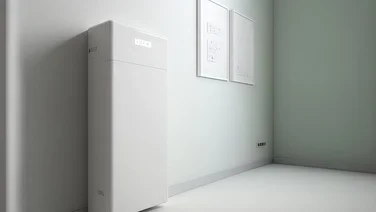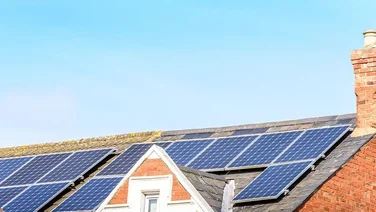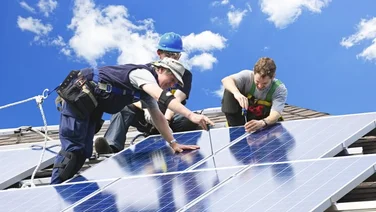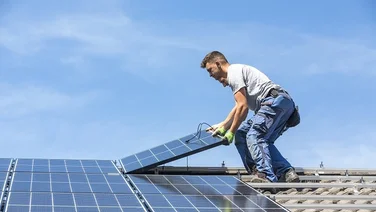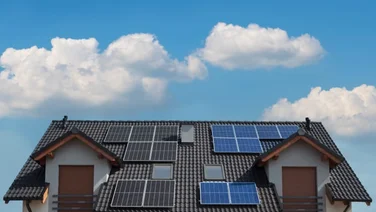We receive a small fee from trusted installers when you request a quote through our site. This helps us keep our content independent, well-researched and up to date – Learn more
✔ E.ON’s solar panel installation service has terrible reviews
✔ Some E.ON solar panels only have a 15-25 year product warranty
✔ E.ON’s solar panels are better than average – but aren’t worth the cost
Thinking of investing in solar energy? It’s a good idea to look to E.ON as a potential solar installer for your home – after all, a good installer will keep down solar panel prices over time.
But before you make your final decision, you’ll want to find out how good E.ON’s solar panel packages are, how much the solar panels cost, and what other customers have thought of the process.
Fortunately, we’ve done all the work for you.
We can also help you to find the best solar panel installers in the UK. All you have to do is provide a few quick details, and our expert installers will be in touch with free quotes for you to compare.
Where do you want to install solar panels?
Get started
What solar panels do E.ON use?
E.ON currently uses solar panels from JA Solar and JinkoSolar.
These are both Chinses companies that now sell solar panels all over the world.
However, E.ON’s range of solar panels is constantly changing, as is the case with most installers, so make sure you check what they have in stock. Solar installers regularly often update as new models become available on the market.
What solar batteries do E.ON use?
If you want to add a solar battery to your E.ON system, it’ll be supplied by GivEnergy.
This Staffordshire-based company offers solar batteries sized between 2.6 and 9.5 kilowatt-hours (kWh), which is a broad enough range to cover the needs of the great majority of households.
Founded in 2018, GivEnergy has managed to earn a four-star rating on Trustpilot, which is a decent score – though it doesn’t compare with any of the best solar installers.
Are E.ON solar panels any good?
E.ON’s solar panels are above average, especially for residential installations, but won’t trouble our list of the best solar panels.
Their efficiency ratings are usually good, and they typically produce more power than most panels.
Most of the panels E.ON offer have an average rate of decline and temperature resistance for residential models.
However, E.ON’s solar panel warranty for its JA Solar panels could be a little better, and their customer reviews aren’t great.
Here’s the full run-down.
Efficiency
One of the JA Solar solar panels E.ON uses, the 405 W All Black panel, has a decent efficiency rating of 20.7%.
It’s not the most efficient solar panel JA Solar offers, which include the JAM72D40, with a whopping 22.5% efficiency rate, but it’s up there.
The other panels in JA Solar’s DeepBlue 4.0X range provide around 22% efficiency, which is still right near the upper reaches of what’s currently possible for residential solar panels.
The JinkoSolar solar panels E.ON offers fairs a little better. The 435 W Jinko panel they have in stock has an efficiency of 21.77%, placing it amongst the top tier for residential solar.
Power
Available with E.ON are some of JA Solar’s DeepBlue panels, which typically supply 84.8% of their original power rating after 25 years, which is on the low side. It’s roughly what you’d expect from top solar panels after 30 years, not 25.
JinkoSolar typically guarantees that its panels will retain 87.4% of their original performance after 30 years, which higher than average.
Warranties
E.ON’s JA Solar solar panels only have a 15-year product warranty, which is quite low considering panels last up to 30 years.
The warranty for E.ON’s JinkoSolar paneles is much better, 25 years.
The best solar companies will hand out product warranties that last 40 or even 99 years, and 25 years is fast becoming the industry standard, with brands like Panasonic REC, and Solaria getting on board.
E.ON’ s performance warranties are better. They last 25-30 years, which is more in line with the industry standard.
Where do you want to install solar panels?
Get startedHow much do E.ON solar panels cost?
E.ON solar panels start at £5,785 for six on-roof solar panels.
This makes this 2.37 kWp system 8% more expensive than the average six-panel installation. A solar panel system of this size typically costs £4,216.
E.ON’s 12 panel package is much better, starting at £7,659, 19% cheaper than the average cost a system of this size.
Unfortunately, E.ON’s starting prices only apply to projects involving concrete tiles, a single elevation of scaffold, single-phase electrics, and zero other complicating factors – meaning you’ll likely pay more.
E.ON also sells in-roof solar panels, with prices starting at £7,932.
The company offers finance packages to help customers afford these products. You can choose between paying for your solar panel installation over 36 months at 0% interest, or paying it back over 10 years at 7.9% APR.
This is a decent finance offer compared to other installers.

Reviews of E.ON solar panels
E.ON’s solar panels and installations receive terrible reviews.
Its review page on Which? has seen customers leave an average rating of 1.7 stars.
Just 14% of reviewers have recommended E.ON’s services.
E.ON doesn’t have a dedicated Trustpilot page for its solar panel category – which is just as well for the company.
After all, from the 601 reviews mentioning ‘solar’ on its main Trustpilot page, we’ve calculated that E.ON has an average rating of 2.6 stars.
52% of reviewers left a one-star rating, which is another extremely bad sign.
For context, our best solar installers research found dozens and dozens (and dozens) of companies with better average scores than this – 79, at last count.
There are a few reasons people may have left such poor ratings.
You’d expect a nationwide supplier like E.ON to operate across the country, but homes in certain locations in the UK can’t currently get E.ON solar panels installed.
So if you do move forward with E.ON, make sure you check whether the company serves your area first.
And despite setting fixed prices for its solar installations – which is a positive – and building up a reputation as a trustworthy stalwart of the energy world, E.ON’s 15-year product warranty on certain panels comes up short.
If a company believes in its products, its actions reflect that – and that’s also true when it doesn’t.
How much money can you save with E.ON solar panels?
The average three-bedroom household can save up to £716 per year with 12 of E.ON’s solar panels, if they’re on E.ON’s 16.5 p per kilowatt hour (kWh) Smart Export Guarantee (SEG) tariff.
However, this tariff is only available for E.ON next customers. If you aren’t a customer, or you used a grant to get your solar panels, E.ON’s SEG rate drops to 3p per kWh.
This means annual your savings would drop to £502, a staggering £214 less than if you were on E.ON’s highest rate.
This is also £142 per year less than a three-bedroom home with the same system could earn on Scottish Power’s SEG tariff.
Scottish Power offers a 12p per kWh rate for your excess solar energy.
The average E.ON next customer with solar panels would break even in just 10.7 years, instead of 14.55 years, the national average.
However, if you’re not an E.ON next customer, it’d take you 15.3 years to breakeven– a little under a year more than the typical solar owner.
Are E.ON solar panels worth it in the UK?
E.ON solar panels are worth it in the UK.
They’re slightly better than average panels, and a typical UK household will still break even on them after in 10.7 to 15.3 years, depending on if they’re an E.ON next customer or not.
That being said, with the average UK break-even point at 14.6 years and solar panels increasingly guaranteed to be effective for 30 years or more, any solar panel owner should break even, whether they’re with E.ON or not.
If you’re on E.ON’s 16.5 p per kWh SEG tariff, you can cut your electricity bills by 86% on average, compared to a 79% reduction if you choose Scottish Power’s rate with the same solar array.
If you’re on E.ON’s 3 p per kWh rate, however, you’ll only cut your bills by 60%.
And if anything goes wrong with E.ON’s JA solar panels after the first 15 years, you won’t be covered, which is unforgivable in the current market climate.
Next steps
You now have all the information you need to make a decision about E.ON’s solar panels.
The next step is to find out how much you’d pay for solar panels, which involves weighing the cost of E.ON’s panels against other companies in the industry.
Thankfully, it’s easy to compare solar panel prices, with our help. Just provide a few quick details, and our expert installers will be in touch with free quotes for you to compare.


